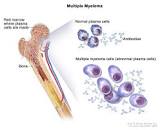
Recently Diagnosed or Relapsed? Stop Looking For a Miracle Cure, and Use Evidence-Based Therapies To Enhance Your Treatment and Prolong Your Remission
Multiple Myeloma an incurable disease, but I have spent the last 25 years in remission using a blend of conventional oncology and evidence-based nutrition, supplementation, and lifestyle therapies from peer-reviewed studies that your oncologist probably hasn't told you about.
Click the orange button to the right to learn more about what you can start doing today.
- You are here:
- Home »
- Blog »
- Multiple Myeloma »
- Multiple Myeloma – Stage 2
Multiple Myeloma – Stage 2

According to one study, more than half of those diagnosed with multiple myeloma in stage 2 live 7 years or more past the start of treatment.
According to research, more than 95% of all newly diagnosed myeloma patients are stage 2 or 3. In 2022 there were more than 34, 000 people diagnosed with myeloma. According to research then, more than 32, ooo of these myeloma diagnoses were stage 2 or stage 3.
At 34,000 diagnoses annually, multiple myeloma is a comparatively rare cancer. Annual breast and prostate cancer diagnoses are in the hundreds of thousands.
And I will admit that the single greatest achievement on the part of conventional oncology has been it’s ability to stabilize the myeloma patient with advanced disease.
Stage 3 myeloma can be advanced and therefore has the shortest average survival statistics. Stage 2 may be just a bit more than early stage aka stage 1. If you have been diagnosed with stage 2 myeloma, it is in your interest to make sure you are not over-diagnosed and then over-treated.
As far back as 2010 Myeloma specialists where hailing the effective responses produced by the three drug combination of revlimid, velcade and dexamethasone (RVd). Which is still the FDA approved standard-of-care for newly diagnosed myeloma.
Just as important, in that same article from 2010, myeloma specialists where questioning the use of an autologous stem cell transplant.
My point is that the stage 2 patient diagnostic testing results could range from lots of myeloma to just a little myeloma. One single standard-of-care therapy plan is simply too broad to coverall all newly diagnosed myeloma patients.
- Stage 2 Myeloma – CBD to enhance VRD?
- Myeloma Stage 2 – Newly dx’ed – anemia, infections
- Myeloma Stage 2 up from SMM – Help!
- Myeloma Stages- Diagnosis Prognosis
Countless myeloma patients contact me questioning the need for different kinds of treatment- see above. As I say, all newly diagnosed myeloma patients are recommended to undergo the same standard-of-care therapy plan.
David Emerson
- Myeloma Survivor
- Myeloma Cancer Coach
- Diretor PeopleBeatingCancer
To gain a complete understanding of Multiple Myeloma Stages – Pre-Myeloma, 1,2,3, restaging and elderly- click now
Multiple Myeloma Stages and Prognosis
“What is a stage? When you’re first diagnosed with multiple myeloma, your doctor will assign it a number, called a stage, that describes how serious it is at that point. That number has a lot to do with the type of treatment your doctor will recommend and what you can expect from your disease going forward…
Stage II
- Your albumin level is low.
- Your B2M is either still normal or a bit high.
- According to one study, more than half of those diagnosed with multiple myeloma in stage II live 7 years or more past the start of treatment.
Treatment of Myeloma: Cure vs Control
“Although not often openly acknowledged, “cure vs control” is the dominant philosophical difference behind many of the strategies, trials, and debates related to the management of myeloma.
Should we treat patients with myeloma with multidrug, multitransplant combinations with the goal of potentially curing a subset of patients, recognizing that the risk of adverse events and effect on quality of life will be substantial? Or should we address myeloma as a chronic incurable condition with the goal of disease control, using the least toxic regimens, emphasizing a balance between efficacy and quality of life, and reserving more aggressive therapy for later?
To be sure, if cure were known to be possible (with a reasonable probability) in myeloma, it would undoubtedly be the preferred therapeutic goal of most patients and physicians. But this is not the case…”

